Results from our 2019 materiality review gave us fresh points of reference in determining our Environment, Social, and Governance (ESG) impact with focus on five key themes: (1) Climate Change and Biodiversity, (2) Resource Efficiency and Waste Management, (3) Workplace Experience and Future of Work, (4) Customer Experience and Protection, and (5) Equitable Business Practices.
We identified metrics to measure the progress of our work for each theme. Using our new Sustainability Reporting Framework, we present the progress we have made in each theme, set against the backdrop of global trends, risks, and opportunities, as well as the strategies we used in pursuing our aspirations.
CLIMATE CHANGE AND BIODIVERSITY
Climate Change

Ayala noted forest fragmentation in Sablayan, Occidental Mindoro.
If the current rate of global emissions is not significantly reduced, there will be exponentially increasing consequences, according to latest reports from the Intergovernmental Panel on Climate Change (IPCC).
The Philippines ranks fourth among countries most affected by climate impact in the past 20 years, based on 2018 studies referenced by the 2020 Global Climate Risk Index published by Germanwatch.
As a business leader that invariably supports national efforts in climate action, Ayala considers climate change as one of its priority sustainability issues. Closely monitoring its carbon footprint, the holdings company actively responds to this issue by mobilizing its business units across three strategies: Mitigation, Adaptation, and Innovation. Ayala’s first strategy is centered on the group’s capabilities to reduce carbon emissions. Ayala promotes climate adaptation by strengthening the resilience of its assets and adjacent ecosystems. It harnesses the collective innovative strengths of its businesses to develop and implement projects that address climate change.
Ayala’s group-wide scope 1 emissions in 2019 reached about 1 million tonnes CO2e, a decrease of 38 percent from 2018 because of AC Energy’s divestment of its thermal assets and interruptions on SLTEC’s operations. Ayala’s 2019 scope 2 emissions from electricity consumption was approximately 0.44 million tonnes CO2e, a 2.6 percent increase from 2018 due to the expansion in several of Ayala’s business units.
Below are highlighted initiatives of Ayala companies on climate change.
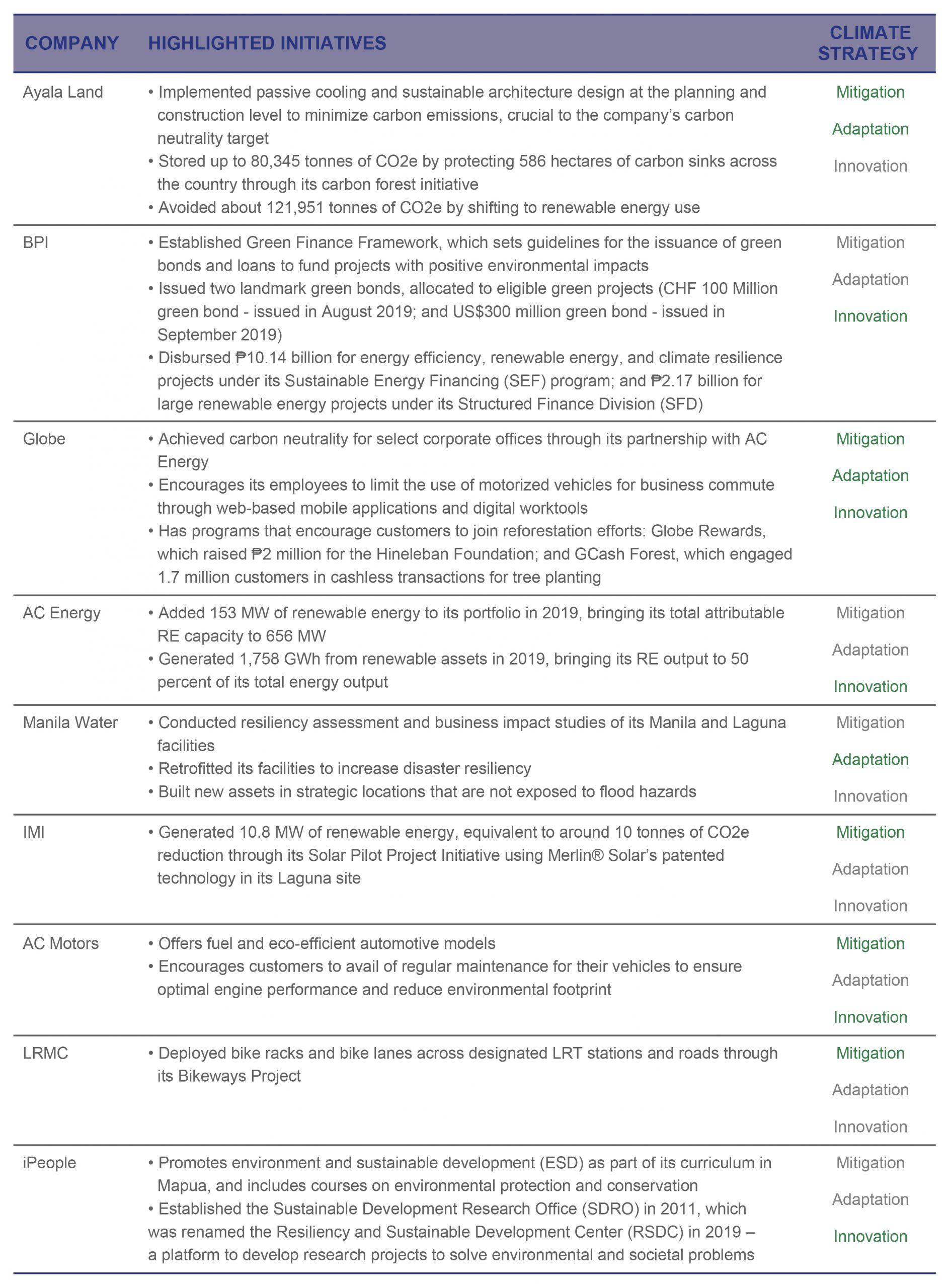
Project Kasibulan embodies Ayala’s commitment to building and managing sustainable ecosystems and communities.
As Project Kasibulan contributed to reforestation efforts and promoted volunteerism among employees across the group, its focus also widened to include the economic welfare of communities as a critical aspect of biodiversity protection.
As it grows and develops into a Reducing Emissions from Deforestation and Forest Degradation (REDD+) initiative, Project Kasibulan adopts the Payments for Ecosystem Services (PES) scheme as a means to incentivize communities for the protection and enhancement of the environment. This allows for a long-term sustainable program that integrates biodiversity protection with economic growth in building the adaptive capacity of both local communities and ecosystems in response to climate change.
Biodiversity
Some of Ayala’s business units operate in areas with rich biodiversity. A United Nations Environment Programme (UNEP) report identifies land use change and climate change as critical pressures on biodiversity. Biodiversity loss can lead to the collapse of ecosystem services, which threatens agricultural productivity, livelihoods, and local flora and fauna species. Thus, integral to the group’s commitment to sustainability is responsible operations and environmental management in these locations.
Below are highlighted initiatives of Ayala companies on biodiversity.
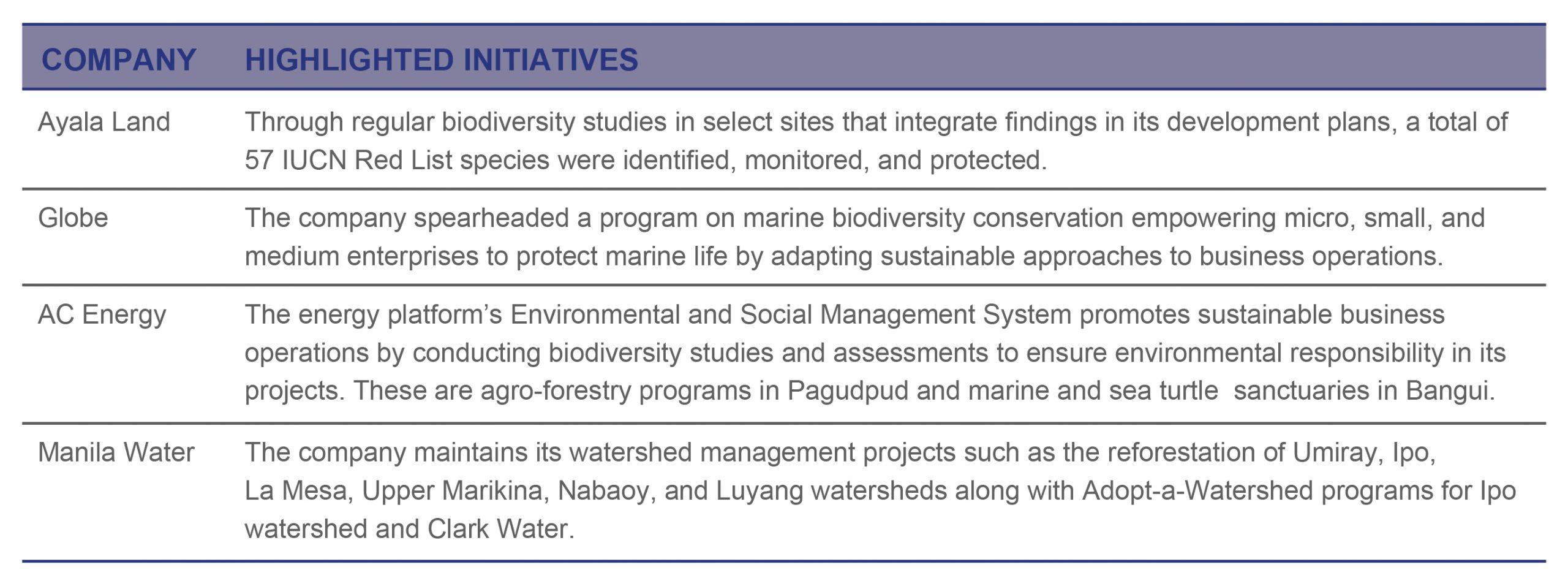
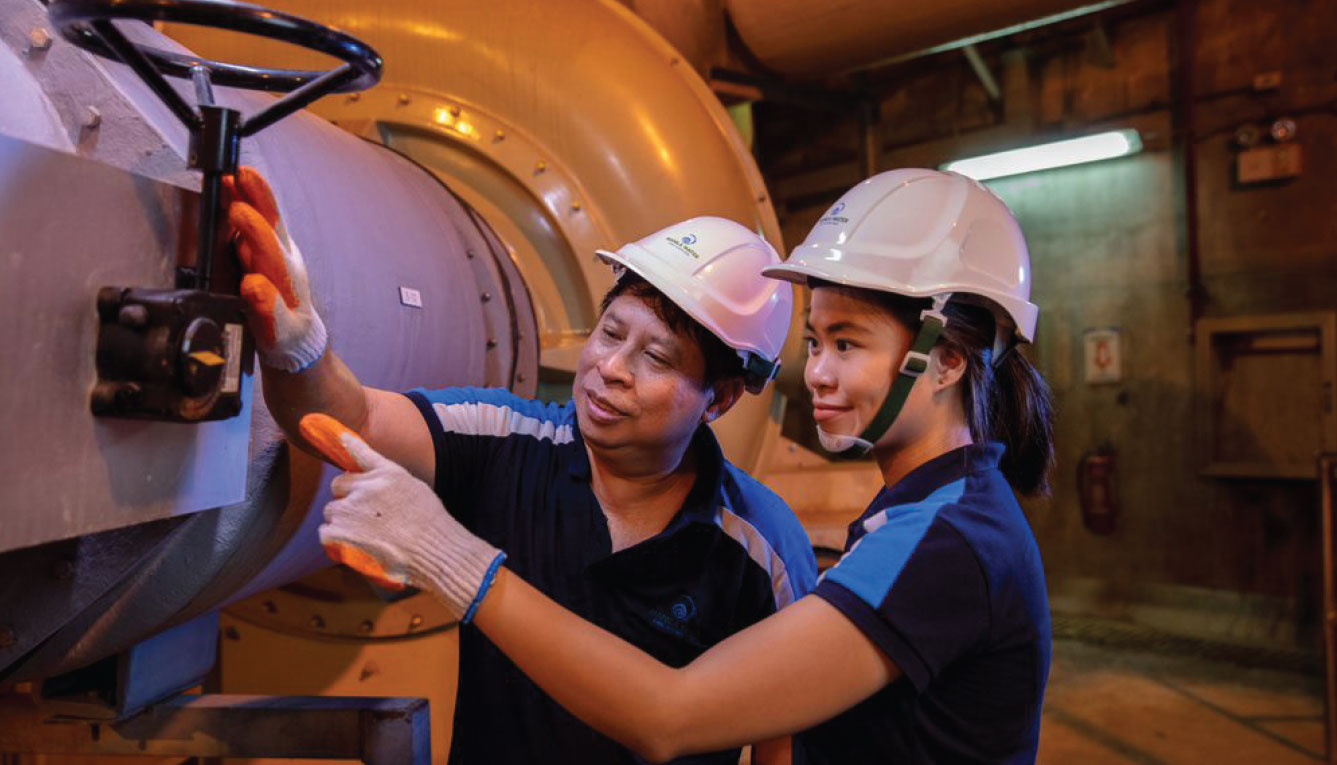
Ayala is mindful of its energy and water consumption.
RESOURCE EFFICIENCY AND WASTE MANAGEMENT
Resource Efficiency
Southeast Asia is one of the most dynamic regions in the world where energy demand is projected to grow by 60 percent in the next two decades. Furthermore, rapid urbanization and development coupled with shifts in climate patterns will increasingly threaten the region’s water security. Being a key player, Ayala’s commitment to resource efficiency is vital.
Ayala constantly monitors its energy and water consumption as key inputs to its operations. In 2019, group-wide consumption of electricity increased while its water consumption decreased. The conglomerate continues to implement energy and water efficiency programs across the group to promote responsible resource consumption.
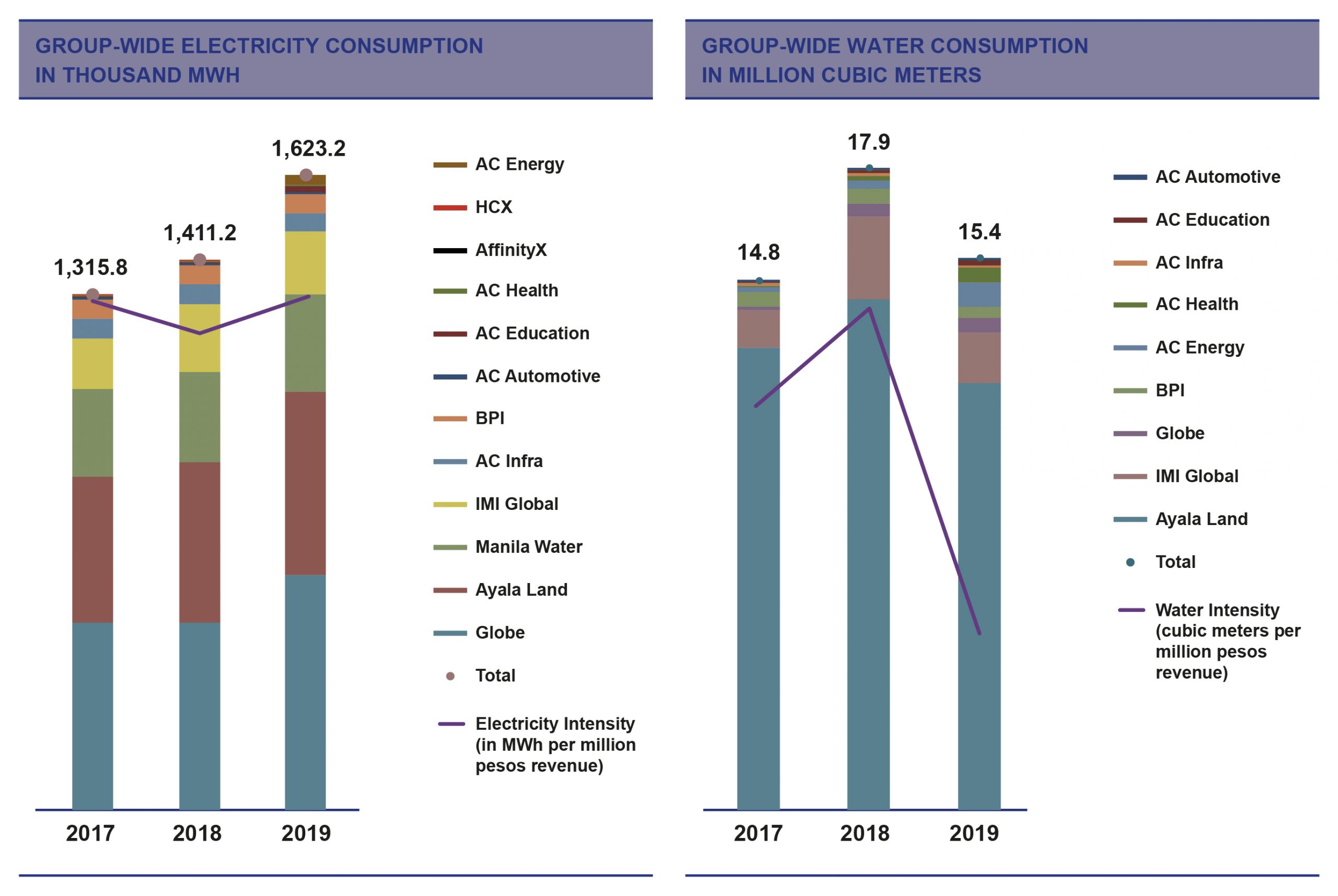
Below are highlighted initiatives of Ayala companies on resource efficiency.
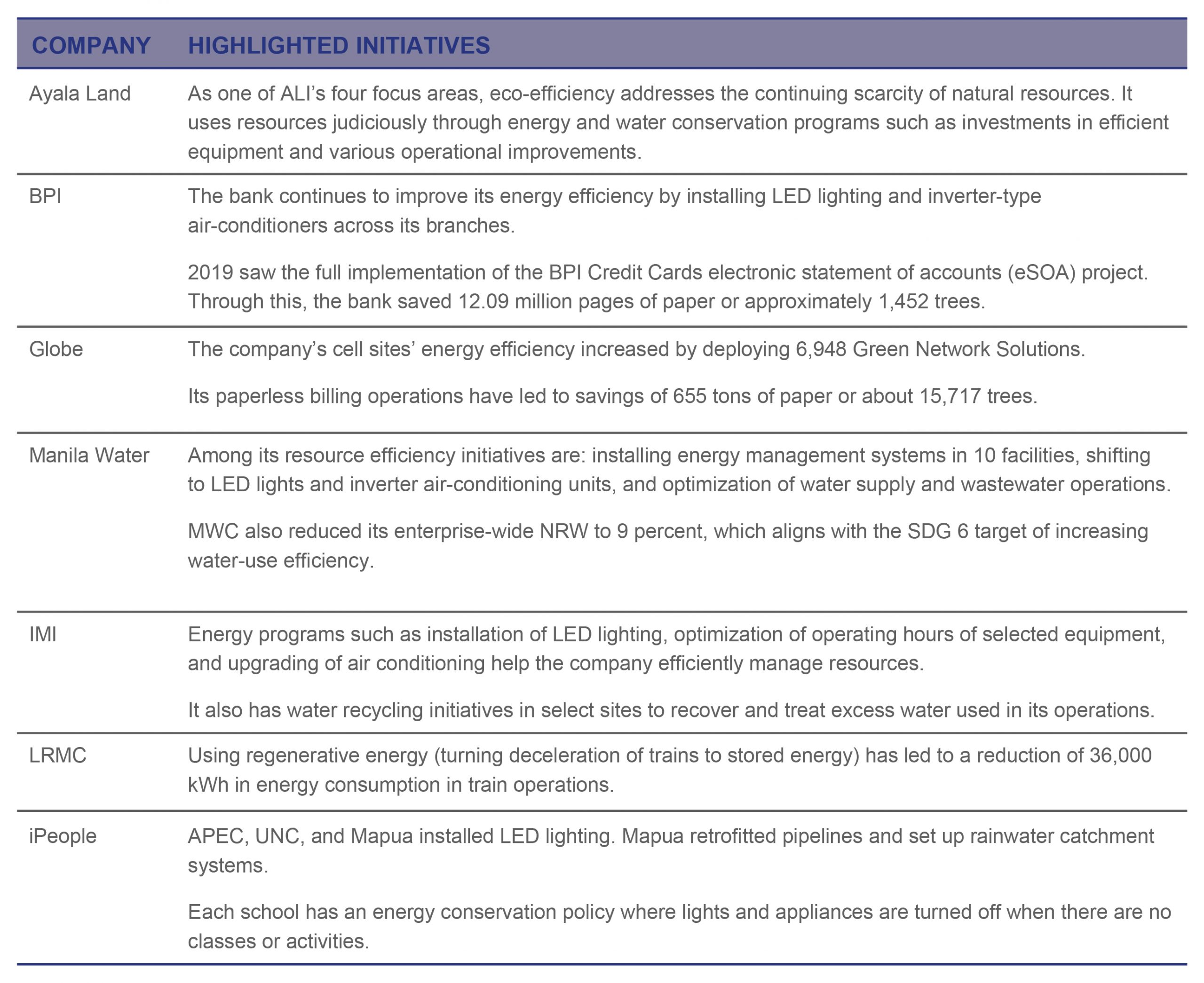
Waste Management
East Asia and the Pacific regions are responsible for 23 percent of total waste generated worldwide1. Ayala, whose businesses operate in these regions, is in a unique position to contribute to national efforts in waste management. The Ayala Sustainability Council, a platform for sharing best practices, helps cascade programs on waste management and resource efficiency across the group. One of these is Ayala’s reduce, recycle, and recover program.
Embedded within Ayala’s environmental policies is its mandate to promote waste management efforts among its people and to seek effective ways to manage waste. Subsidiaries incorporate waste management into their due diligence process and environmental initiatives. The group also observes proper protocol for the transport, treatment, storage, and disposal of hazardous waste. In 2019, the group generated 48,632 tonnes of non-hazardous waste. Ayala commits to improve its performance in managing its material footprint.
Below are highlighted initiatives of Ayala Companies on waste management.
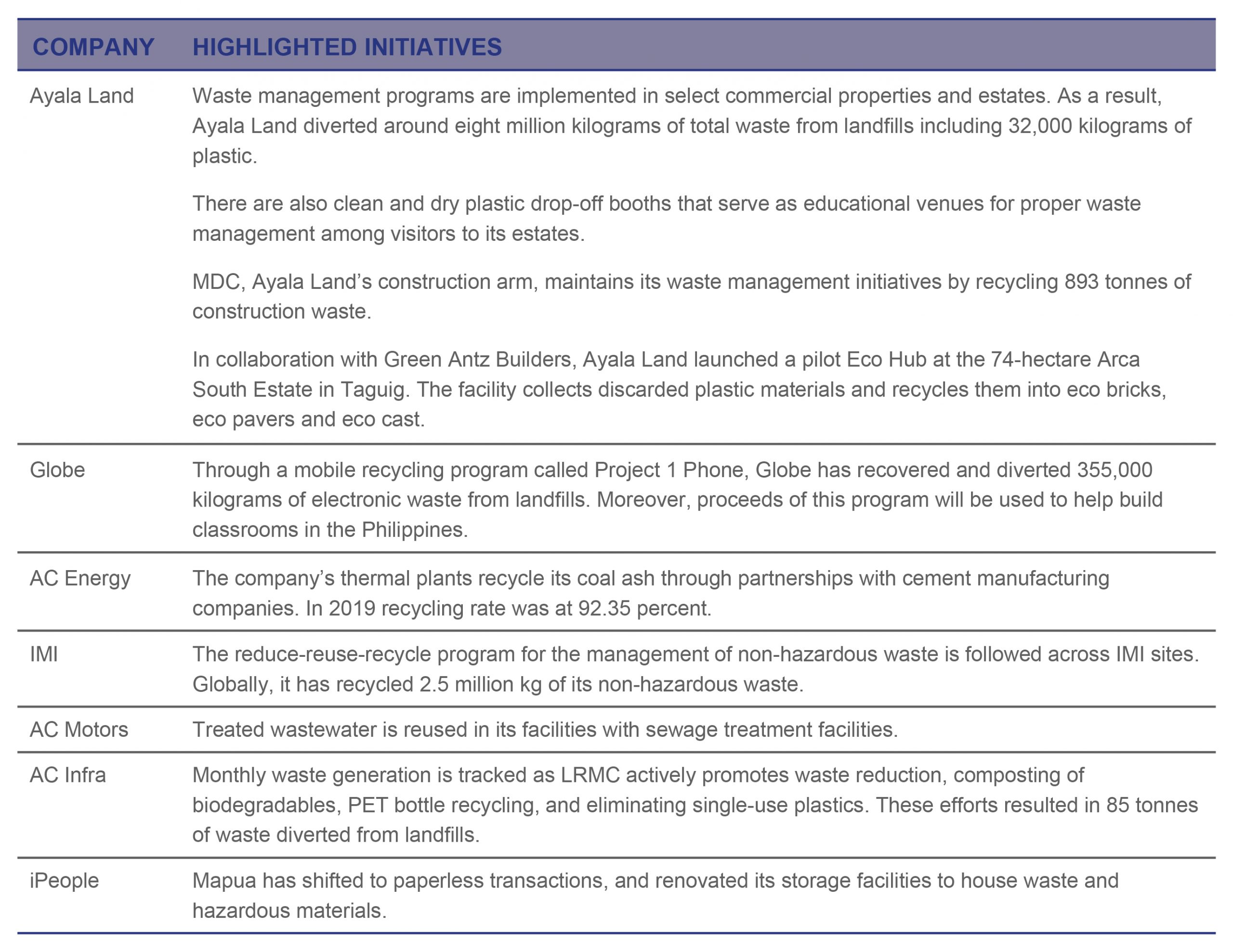
WORKPLACE EXPERIENCE AND FUTURE OF WORK
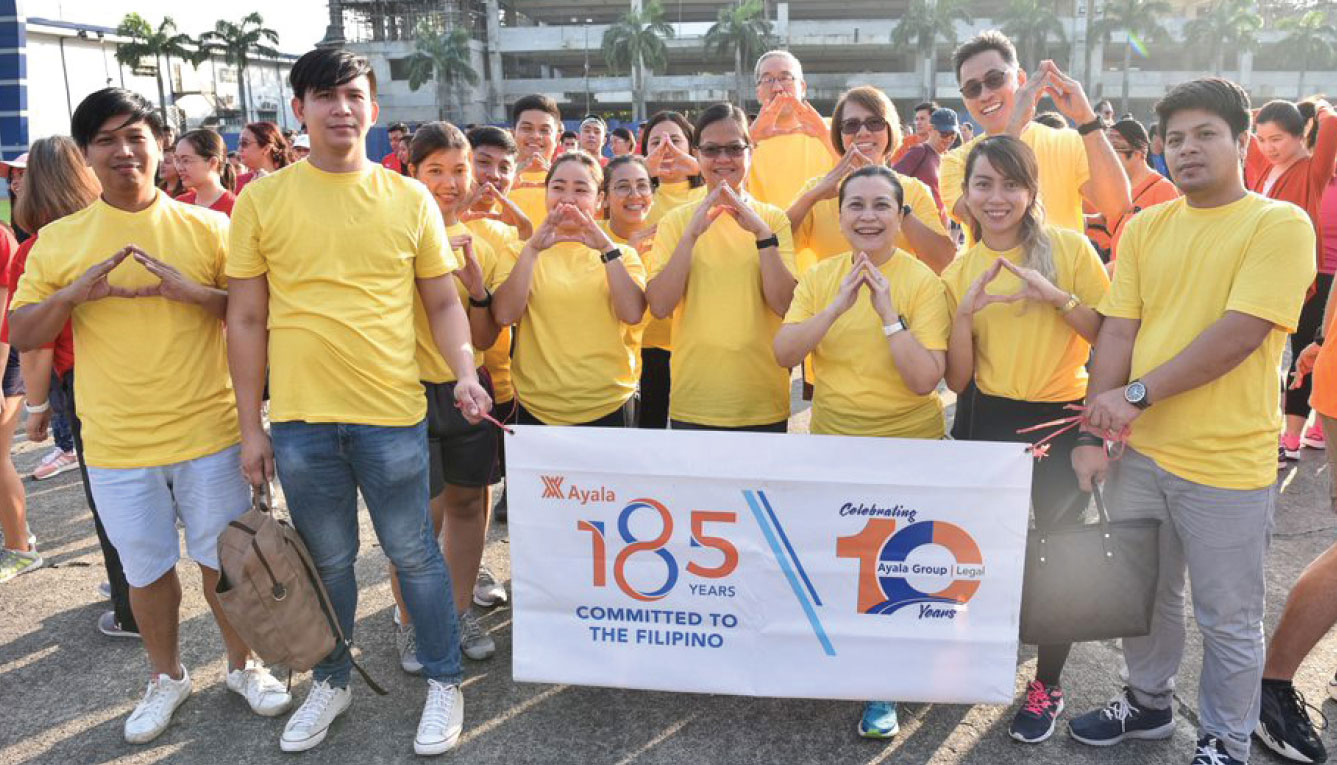
Opportunities for growth are abundant in the Ayala group.
Ayala’s Human Resources Council led by Ayala Corporation’s Chief Human Resource Officer, fosters and harnesses synergy to improve human resource services across the group. It also shares best practices to adapt and ride the wave of developments shaping human capital.
In order to continue to be the employer of choice, Ayala acknowledges trends such as the growing number of millennials in the workforce (projected to reach 75 percent by 2025)2, emphasis on workplace experience, and flexible working arrangement, among others. The council studies their impact into its businesses and adapts to the changing expectations of the new workforce.
Employee engagement
Ayala gives premium to the holistic development—professional and personal growth—of its employees, aware that the most important aspect of productivity is the human element. An employee whose potentials are nurtured is motivated to perform at an optimum level of efficiency.
Productivity is further enhanced given right working conditions. Across the Ayala group, this is a shared conviction.
Every two years, the Ayala group conducts an employee engagement survey with Willis Towers Watson. Following are the results of the survey.
The group attained a 97 percent participation rate, which is 1 point and 2 points higher compared to the 2017 and 2015 overall participation rate, respectively.
The Willis Towers Watson’s framework measures engagement in three areas—Energy, Enablement, and Engagement. This cycle, the Ayala group’s overall Sustainable Engagement (SE) score is at 87 percent, one point lower than in 2017.
Within the workforce of Ayala, 86 percent consider themselves Energized. Energized employees find a sense of personal accomplishment in their work and in working with others in their team. As a result, they tend to have good individual, interpersonal, and emotional well-being at work.
Among Ayala employees, 80 percent are Enabled and believe that resources and tools are for them to do their job effectively with fewer obstacles.
Meanwhile, 95 percent consider themselves Engaged. More than Energized and Enabled, Engaged employees work more than what is required to ensure success. They have a firm belief in our mission and are proud to be part of the conglomerate. A key finding indicates that Ayala group employees strongly associate with their respective brands and goals.
Key Engagement Drivers
Across the Ayala Group, the following are the strongest influencers to the Sustainable Engagement score:
• Empowerment
A good 89 percent of employees acknowledge they have sufficient authority to do their job well (two points higher than the 2017 performance). About 95 percent believe their work contributes to the company’s business objectives which give them a sense of personal accomplishment.
Our efforts to keep employees informed on important matters affecting the organization keep them empowered. In addition, 80 percent of employees appreciate that Ayala provides a climate where people can challenge and improve traditional ways of doing things (four points higher than the 2017 score). About 82 percent claim their supervisors are receptive to suggestions for change (four points higher than in 2017).
Employees also feel empowered as 78 percent see they have ample opportunities to improve their skills and grow in the company (three points higher than in 2017). The adequate recognition and non-monetary rewards provided for good performance also drive empowerment. Ayala scored 75 percent in this aspect, which is six percent points higher than the Philippine norm. About 76 percent believe their job performance is evaluated fairly, while 73 percent claim the performance review helped them improve their job performance (score is one point higher than 2017 in both areas). Employees believe the Ayala group did a good job in promoting the most competent people.
• Operating Efficiency
The group acknowledges that an efficient and streamlined process enables employees. About 90 percent of our employees recognize continual efforts toward process efficiency. They also see the value of the use of appropriate technology to improve internal operating efficiency. About 80 percent say sufficient effort is being made to make processes more streamlined and cost effective. These interventions help remove obstacles and allow employees to do their jobs effectively.
• Leadership
High confidence in senior management decisions keeps employees highly engaged. Ayala scored higher than the Philippine norm on this metric. In addition, 82 percent consider management decisions to be consistent with Ayala values.
The high performance on this aspect is due to several factors. Primarily, 85 percent are convinced their management is interested in the well-being of the employees. Secondly, 91 percent believe their respective companies operate with integrity in its external dealings with customers and suppliers, among others. In fact, 79 percent of employees say internal processes are geared toward providing the best possible service to external clients.
Results also show that employees have high regard for the standards of integrity across the organization, such that the majority are willing to report instances of dishonest or unethical practices to appropriate levels of authority without fear of reprisal.
Finally, the workforce appreciates the way feedback and recognition are provided. About 80 percent declare they get regular feedback on their performance from their supervisors and 83 percent say their supervisor gives recognition for a job well done.
• Working Relationships
Good working relationships make teams more effective and energized. A healthy exchange of ideas is crucial for achieving the team’s deliverables. Fundamental to maintaining good working relations is how each employee feels respected. A good 88 percent of employees say they are treated with respect regardless of their role. Employees find good allies in the people within and outside their teams in achieving their deliverables and in managing stress levels.
Below are some initiatives of Ayala companies on employee engagement informed by the results of the 2017 employee engagement survey.
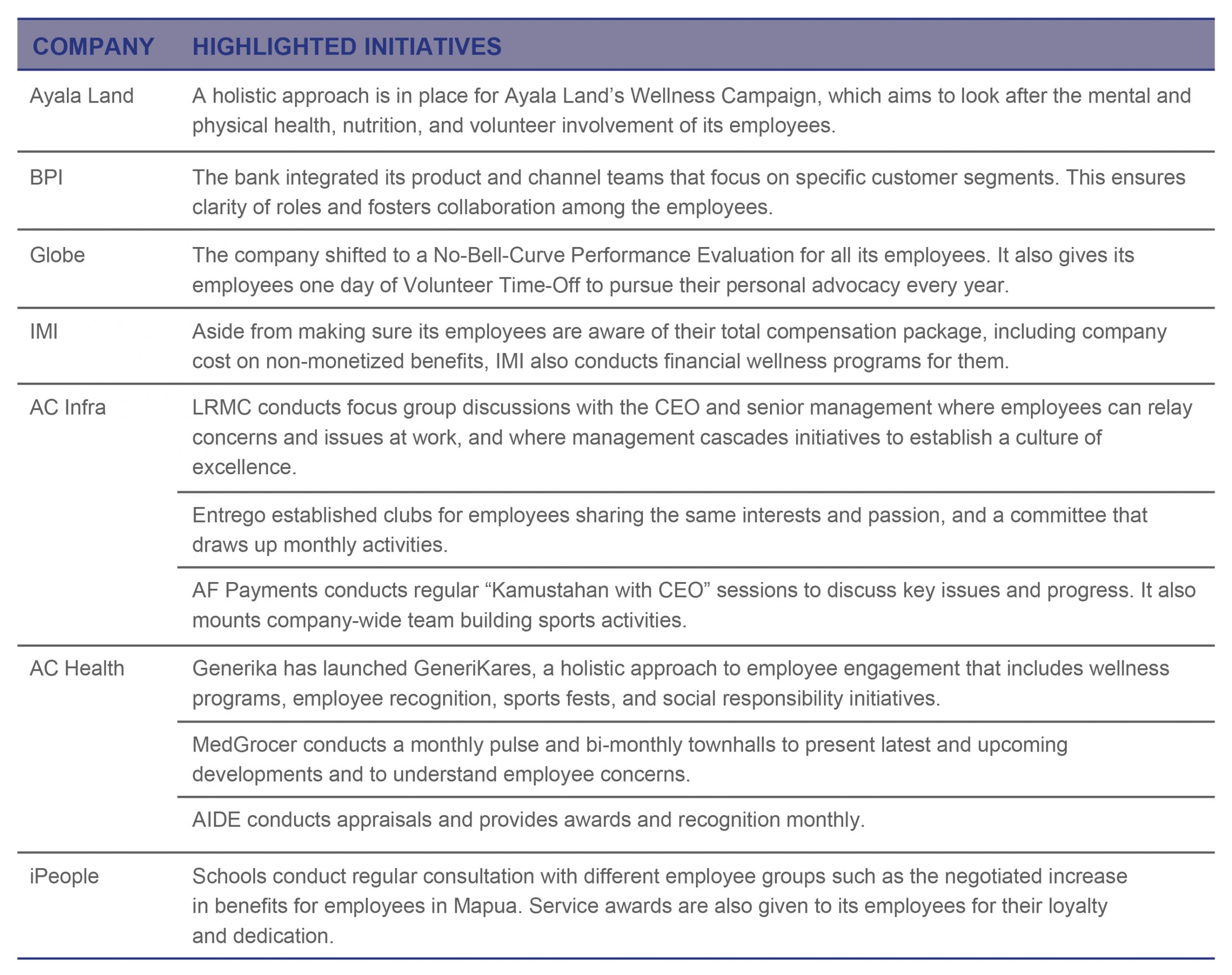
Enhanced Workplace Experience
Ayala companies continue to improve processes, initiatives, and programs in human resources – from recruitment, training and development, provision of relevant work tools, among others.
Below are some highlighted initiatives on how the Ayala group enhances workplace experience.
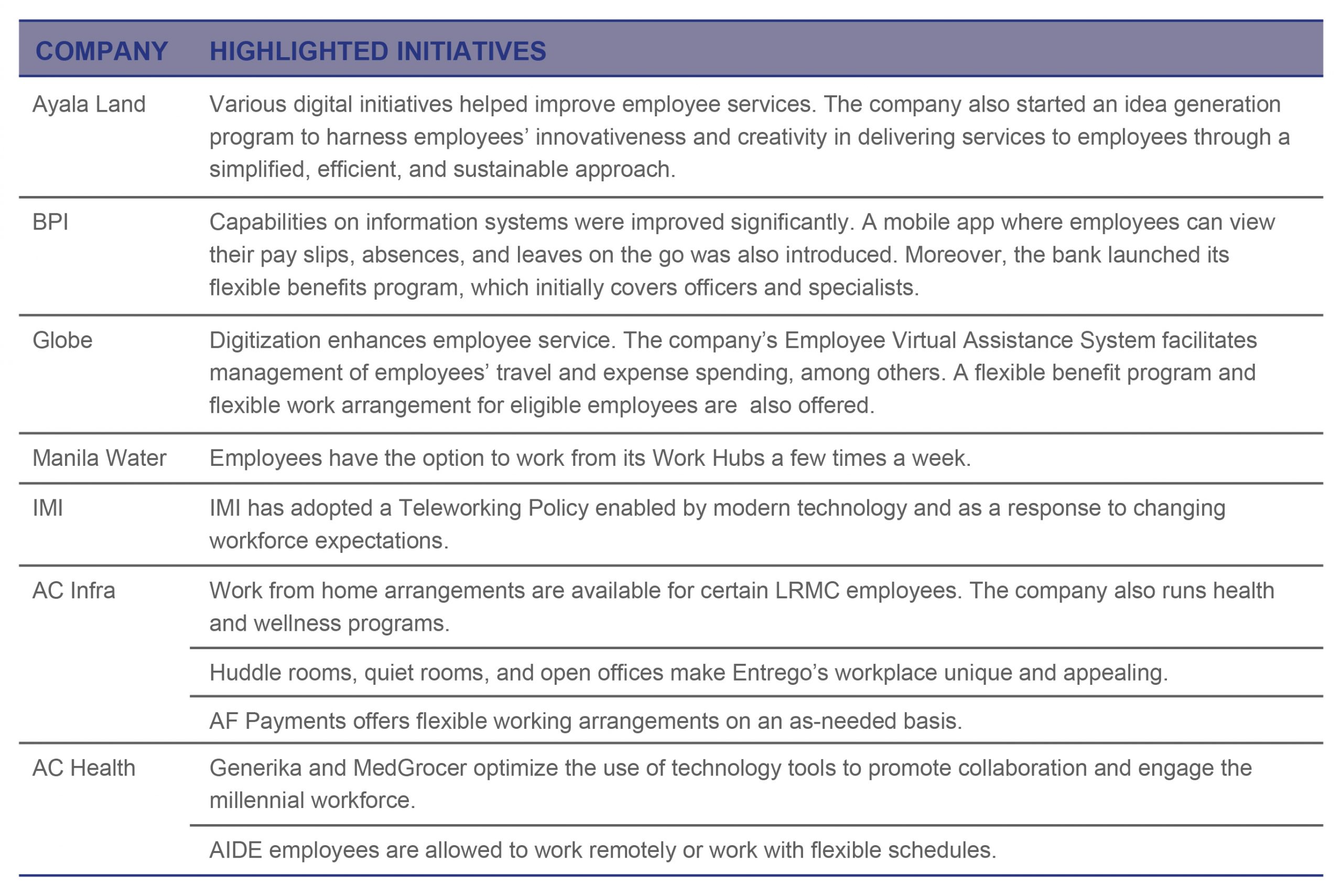
Ayala ensures safety in the workplace guided by its policies on child and forced labor, occupational health and safety, and hazard management. Ayala does not employ children and does not encourage forced labor across its operations. Furthermore, companies observe strict compliance with relevant rules and regulations on occupational health and safety. We strive to ensure a safe and healthy working environment for our employees. We work with our suppliers to ensure that they, too, adhere to the same standards.
Below are occupational health and safety statistics for a few Ayala companies participating in labor intensive sectors in 2019:

Inclusive Workplace
Provided with equal opportunities, a diverse workforce opens companies to innovative ideas that improve the value creation process. The Ayala group provides equal opportunities and strictly enforces its Recruitment, Compensation, and Retrenchment Policy, which does not discriminate on the basis of gender, sexual orientation, political affiliation, among others.
The total number of direct employees across the Ayala group increased to 72,013 in 2019, with male-to-female ratio of 1:1.33. Ayala companies have a young workforce, where 41 percent are under 30 years old and 51 percent are between the ages of 30 and 50.
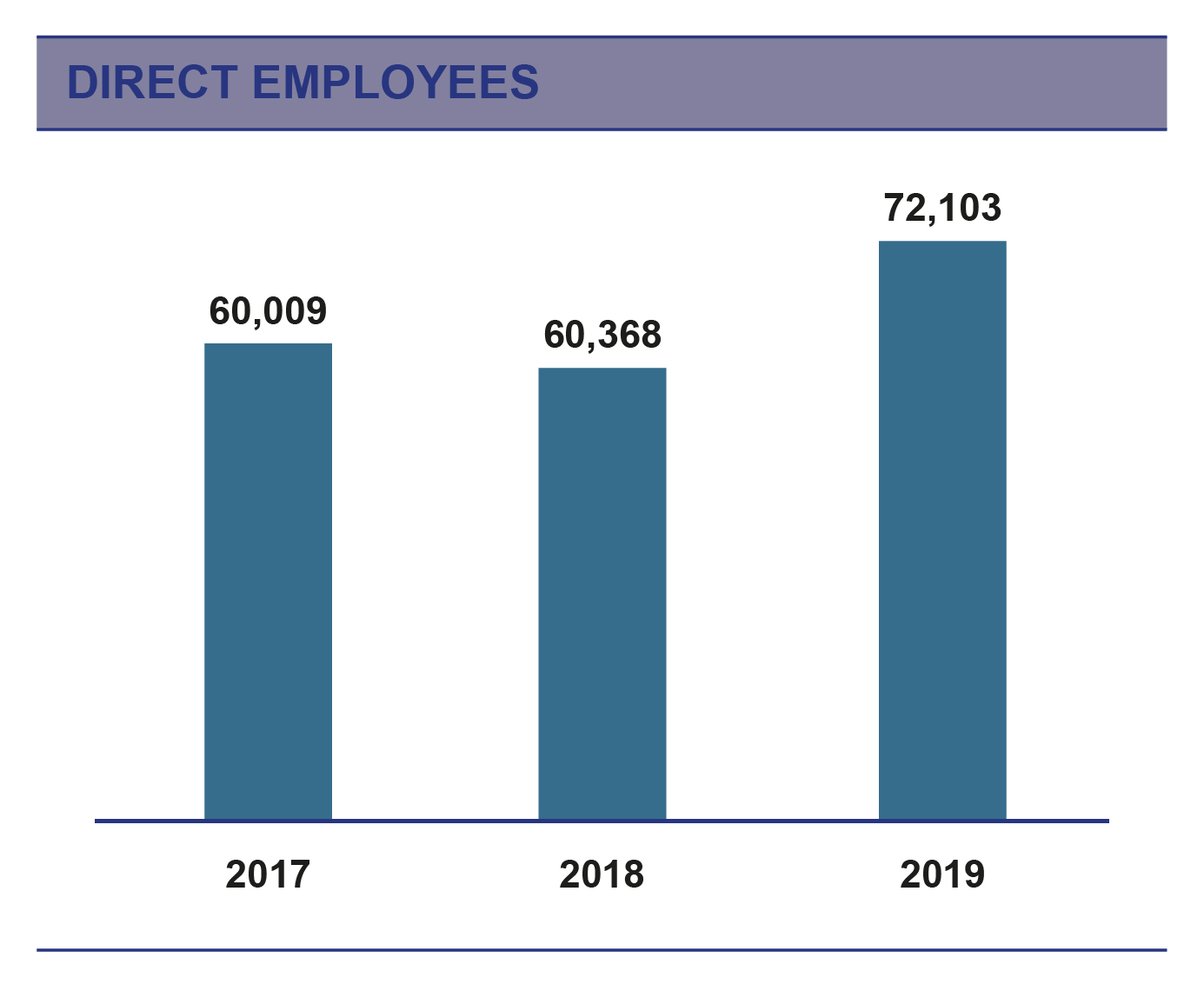
Below are some initiatives on how our business units create an inclusive workplace.
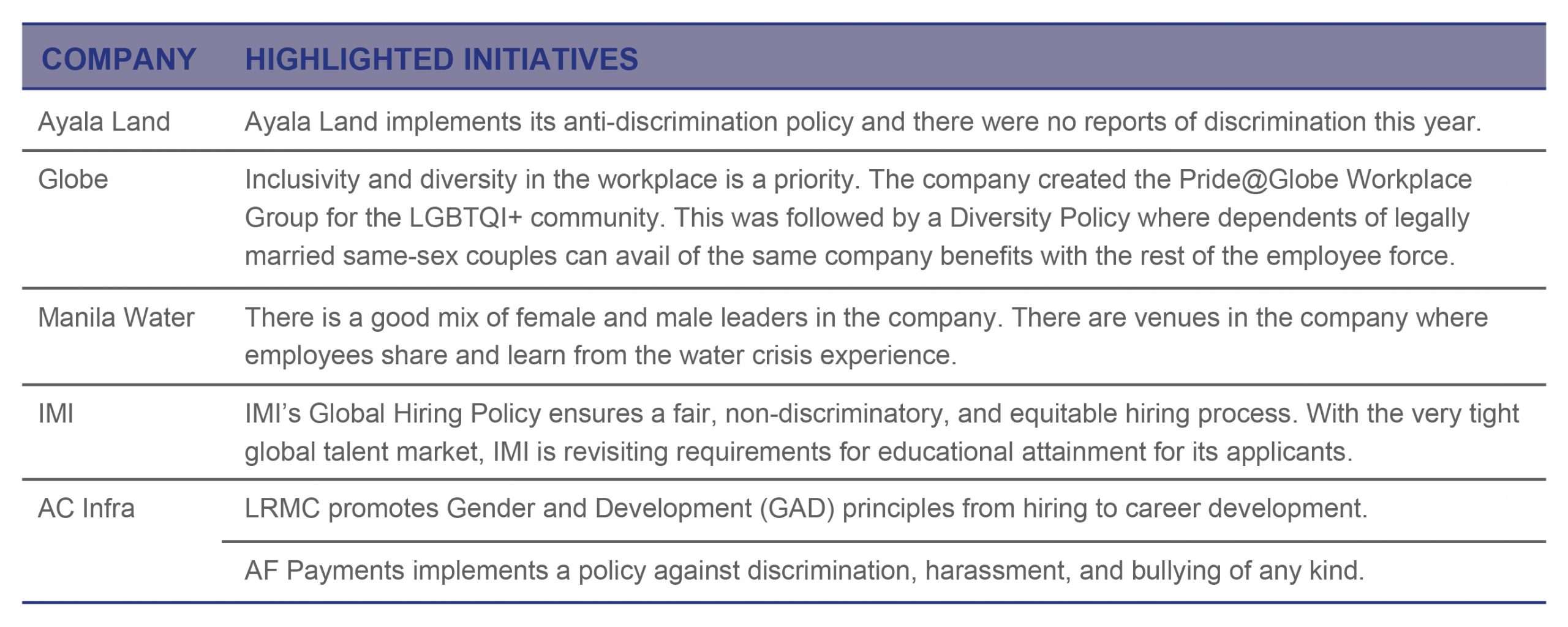
Talent Development and Future of Work
Ayala companies offer various training programs, e-learning platforms, and support in pursuing post-graduate degrees to develop the employees’ full potential – professionally and personally.
In 2019, Ayala companies provided more than 3.8 million hours worth of training for its workforce, averaging about 60 hours of formal training per employee.
Ayala recognizes that digitalization will propel its businesses to the future and this requires acquisition of new skill sets for its employees. The conglomerate formed a group of data analytics professionals in support of digital transformation.
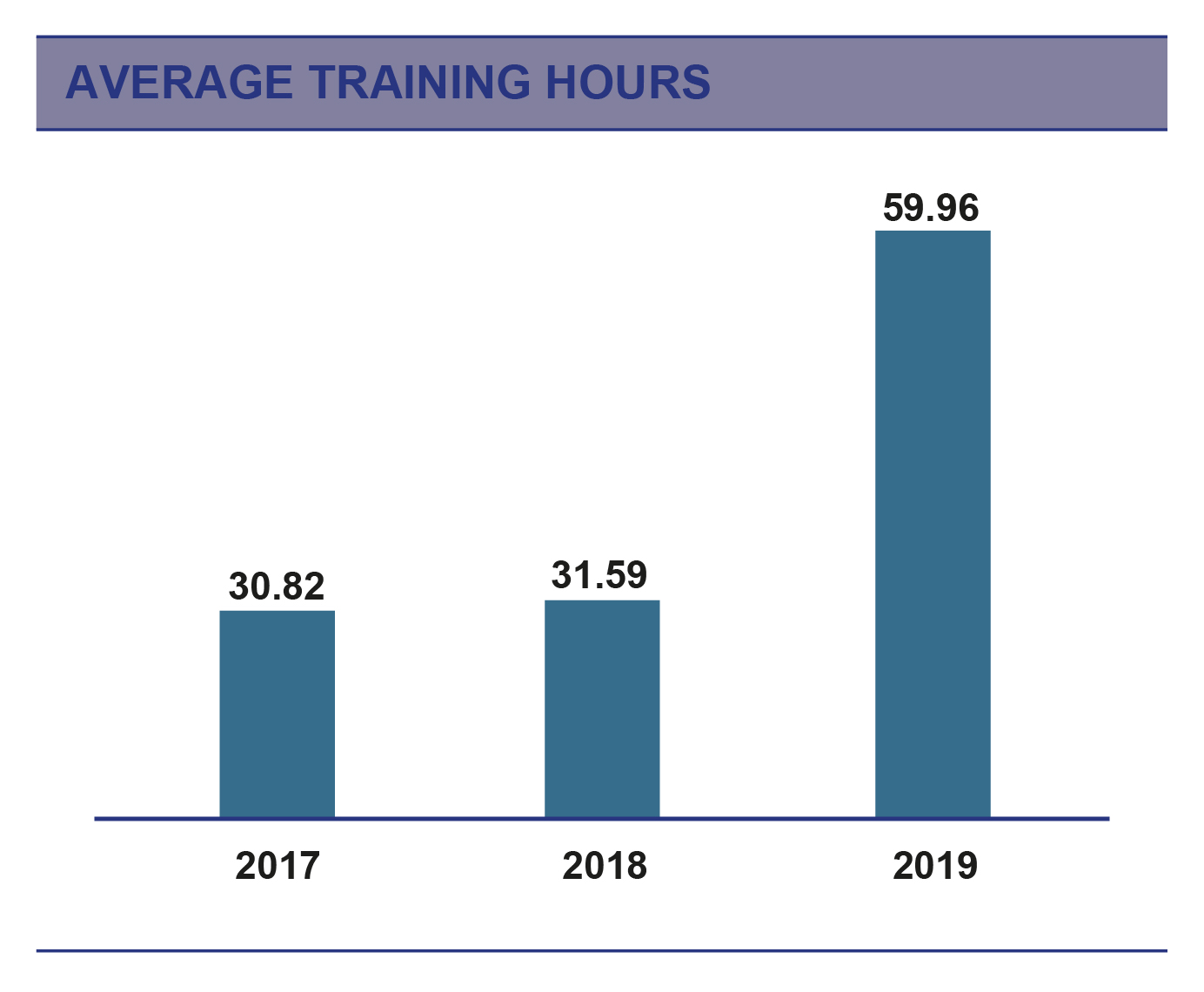
The following are highlighted initiatives of Ayala companies on talent development.
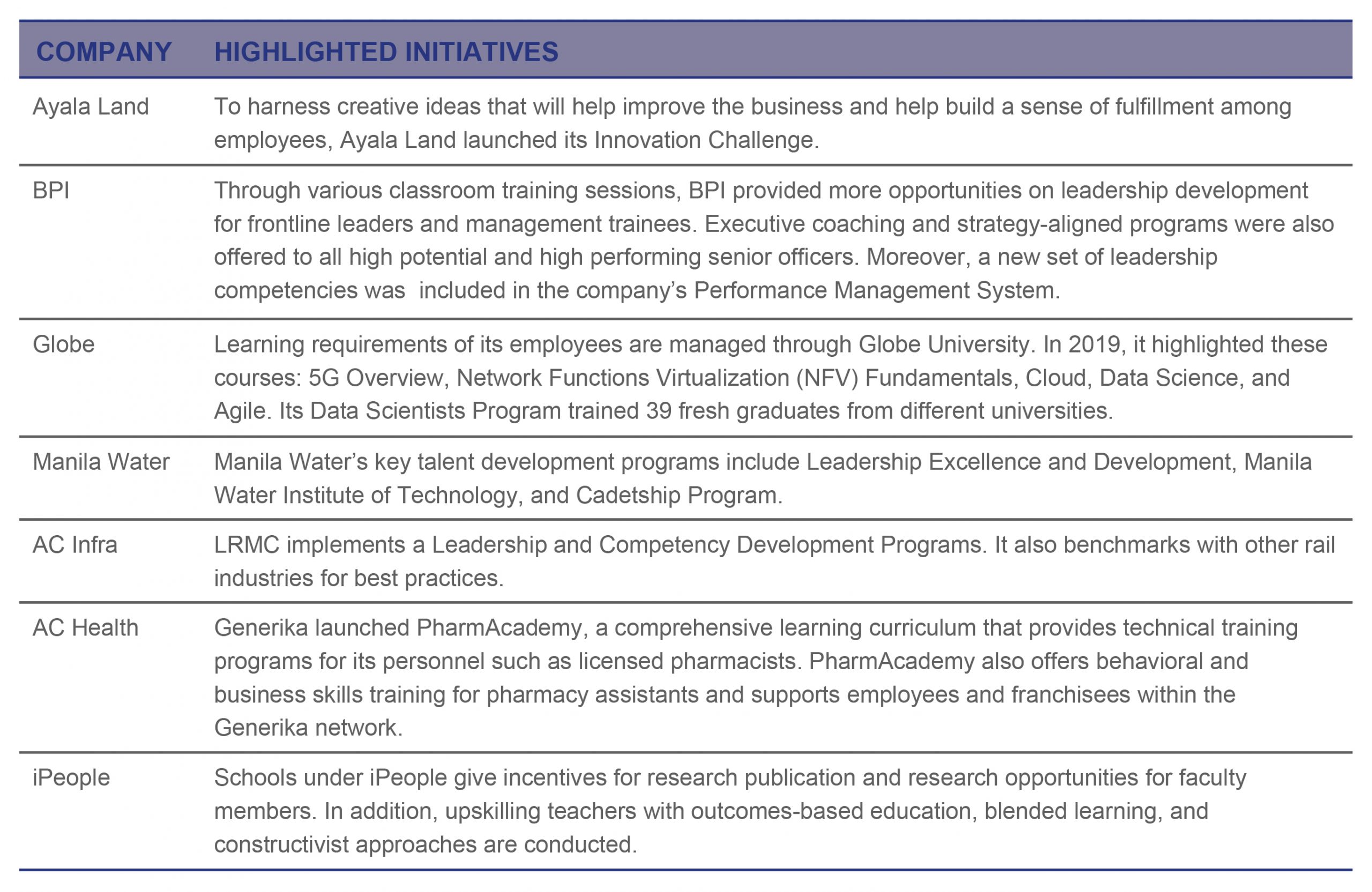
CUSTOMER EXPERIENCE AND PROTECTION
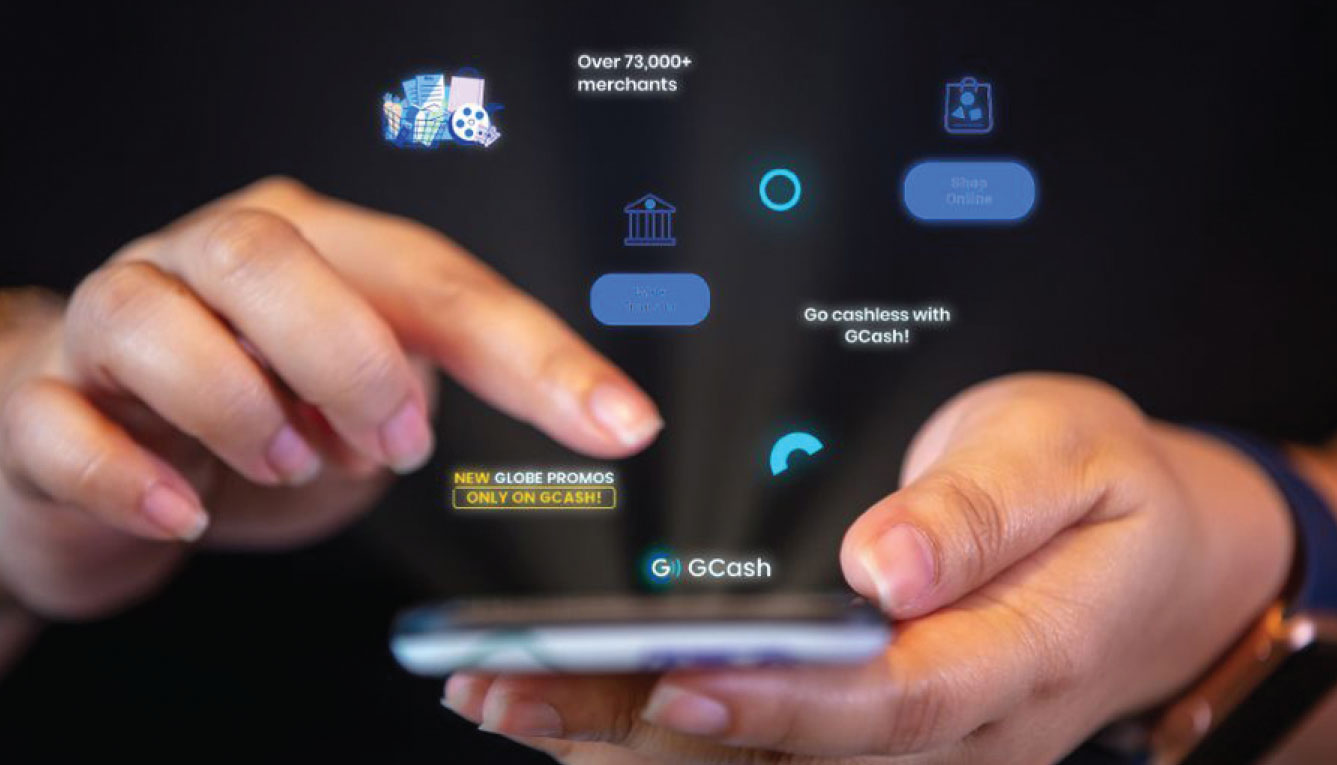
Digitalization influences our strategies to elevate customer experience.
Several global trends shape customer behavior and expectations across industries. Knowing how to optimize opportunities, these trends play a vital role in the success of businesses. These include the following:
• Emphasis on customer experience – closing the gap between client expectations and a company’s capacity to meet them; knowing that consumers are willing to pay more to save time and for a good customer service; consumers will expect the same level of service, regardless of industry
• Growing concern for data privacy – more personalized products and services require more personal information from customers for targeted forms of advertising; protecting these data is a responsibility businesses should take seriously
• Empowered and conscious customers – products and services that can be personalized and that create an environmental and social impact draw more consumers because these give them control over the way they consume
Always putting customers first, Ayala considers these trends in drawing up innovative approaches to increase customer value, improve customer experience, and empower consumers including those with limited access to basic goods and services.
Customer Experience
Ayala develops channels to meaningfully engage with customers in order to deeply understand and effectively respond to their needs, ensuring a frictionless customer experience.
Below are some of Ayala companies’ programs to improve customer experience.
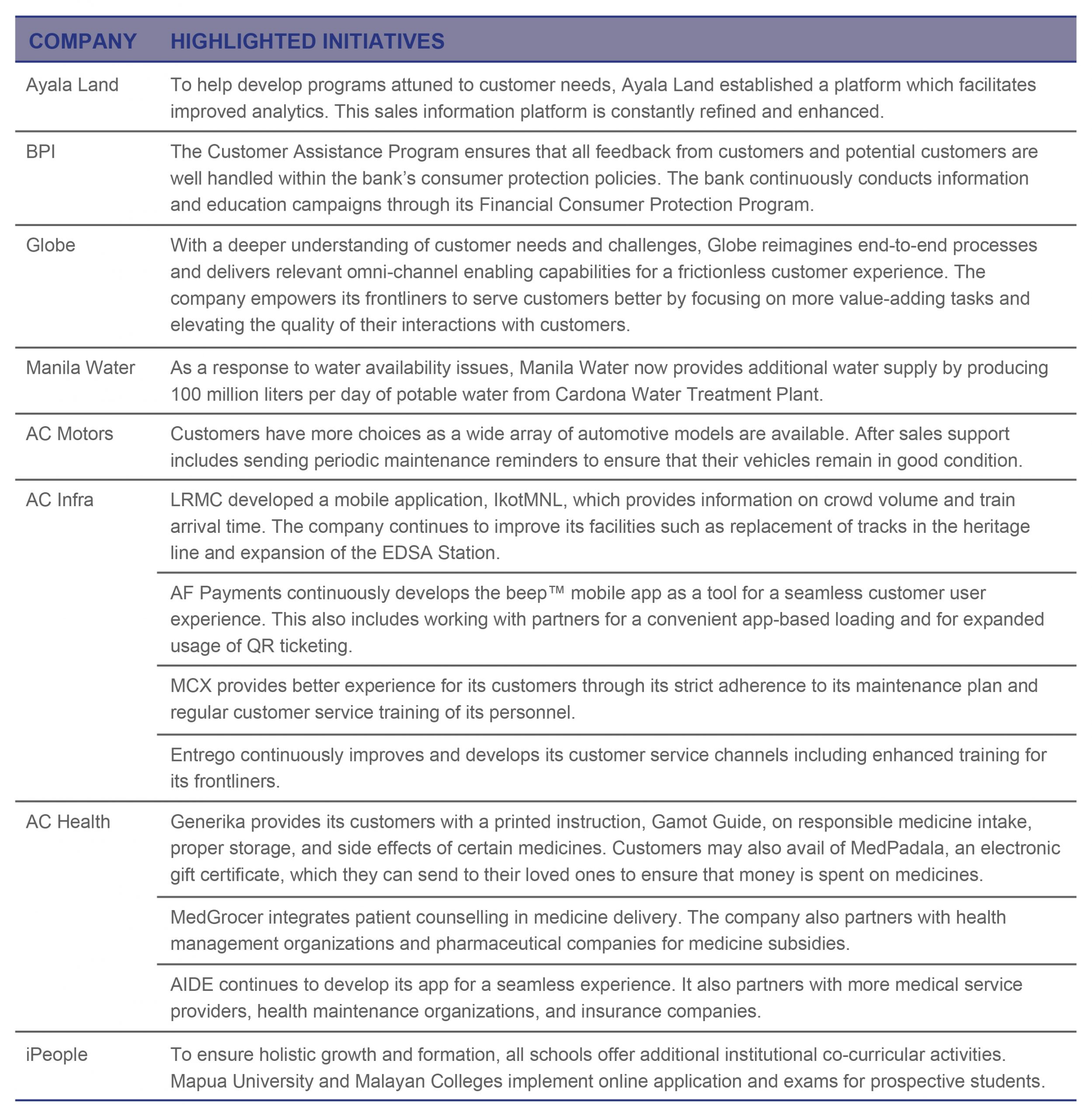
Ayala companies monitor customer satisfaction using relevant metrics to their industry. Following are the results of customer satisfaction surveys for the last three years:
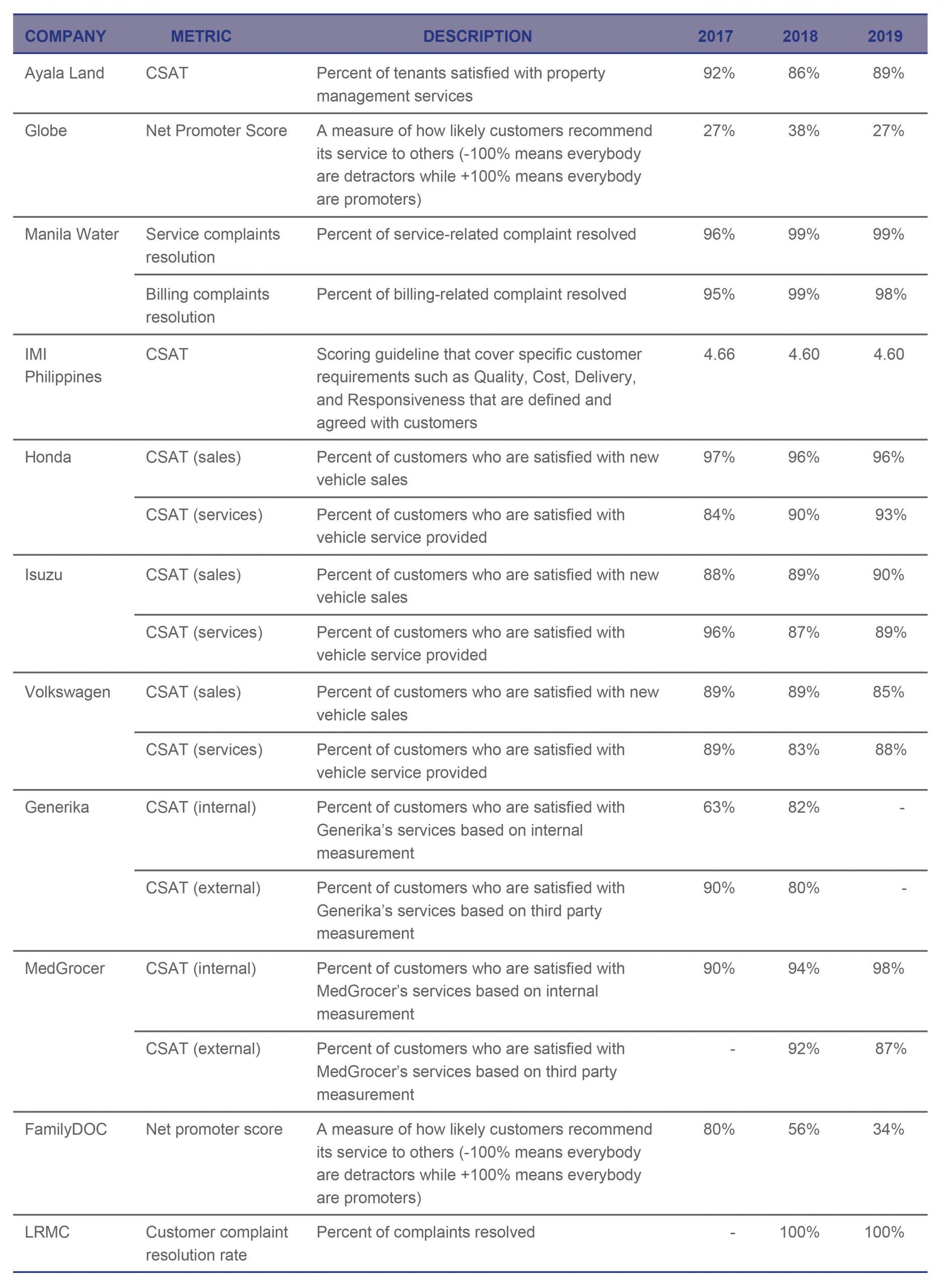
Customer Protection
Ayala ensures the safety of its customers within its facilities by deploying well-trained security personnel in their vicinity and by training our employees on emergency drills.
Beyond safety from physical threats, Ayala also puts importance on protecting the fundamental right to privacy of its customers in compliance with the Data Privacy Act. Data privacy trainings are conducted for all employees annually.
Some of the other initiatives of Ayala companies on customer protection include:
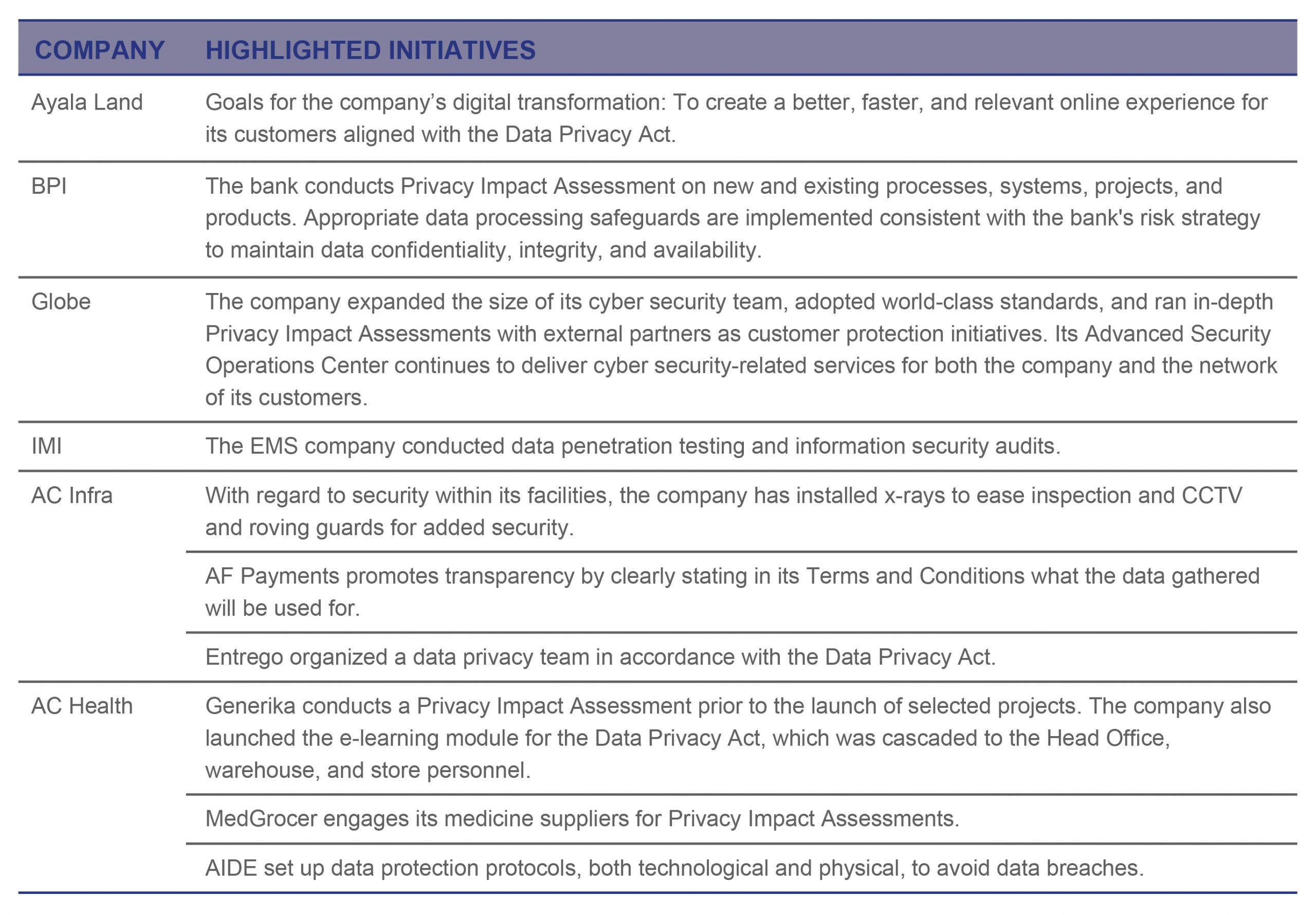
Customer Empowerment
Ayala provides options and resources to customers to give them more control over their purchases and the kind of experience they want to have. This includes providing assistance to vulnerable groups for better access to our products and services and offering more options for a sustainable lifestyle.
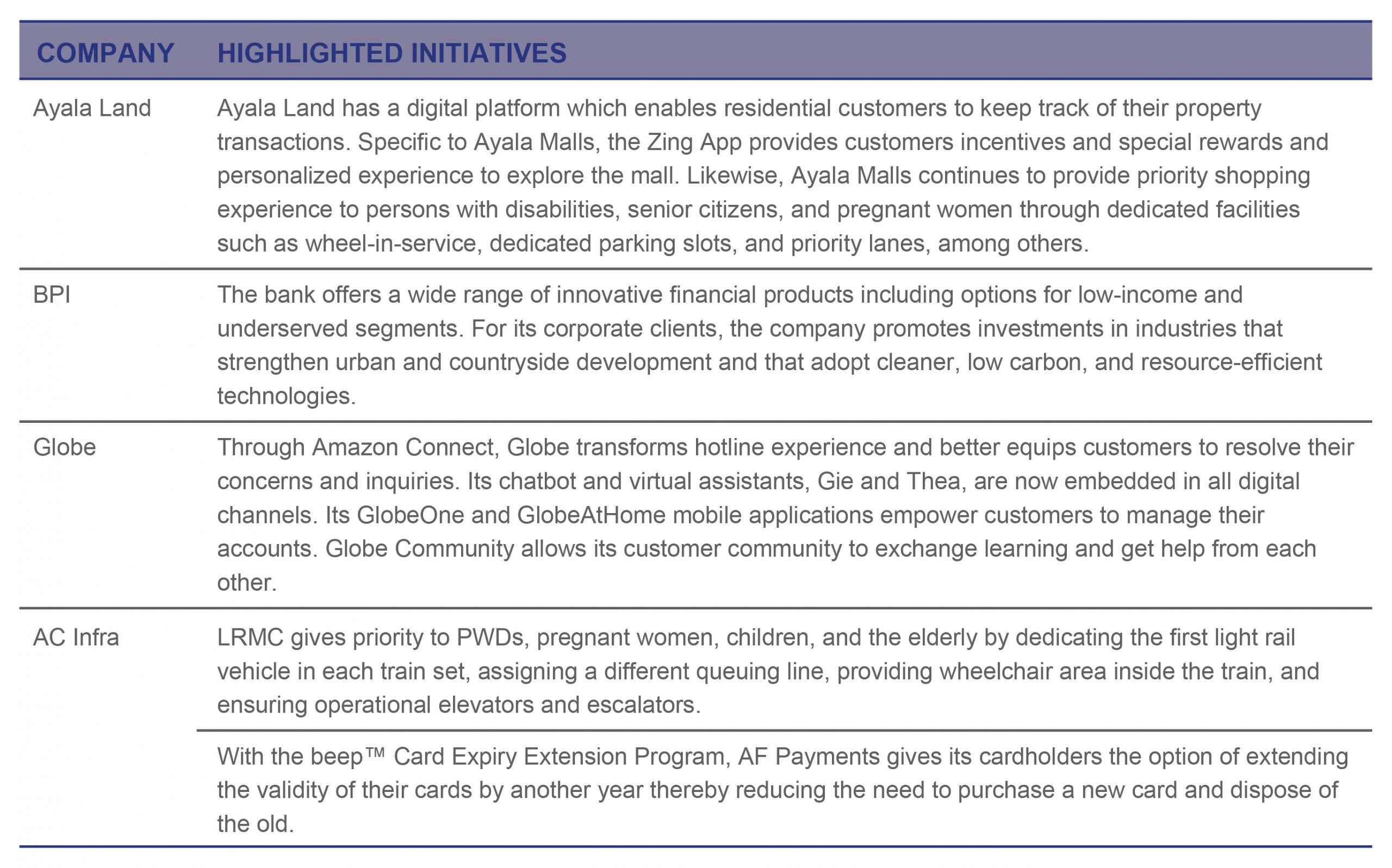
EQUITABLE BUSINESS PRACTICES
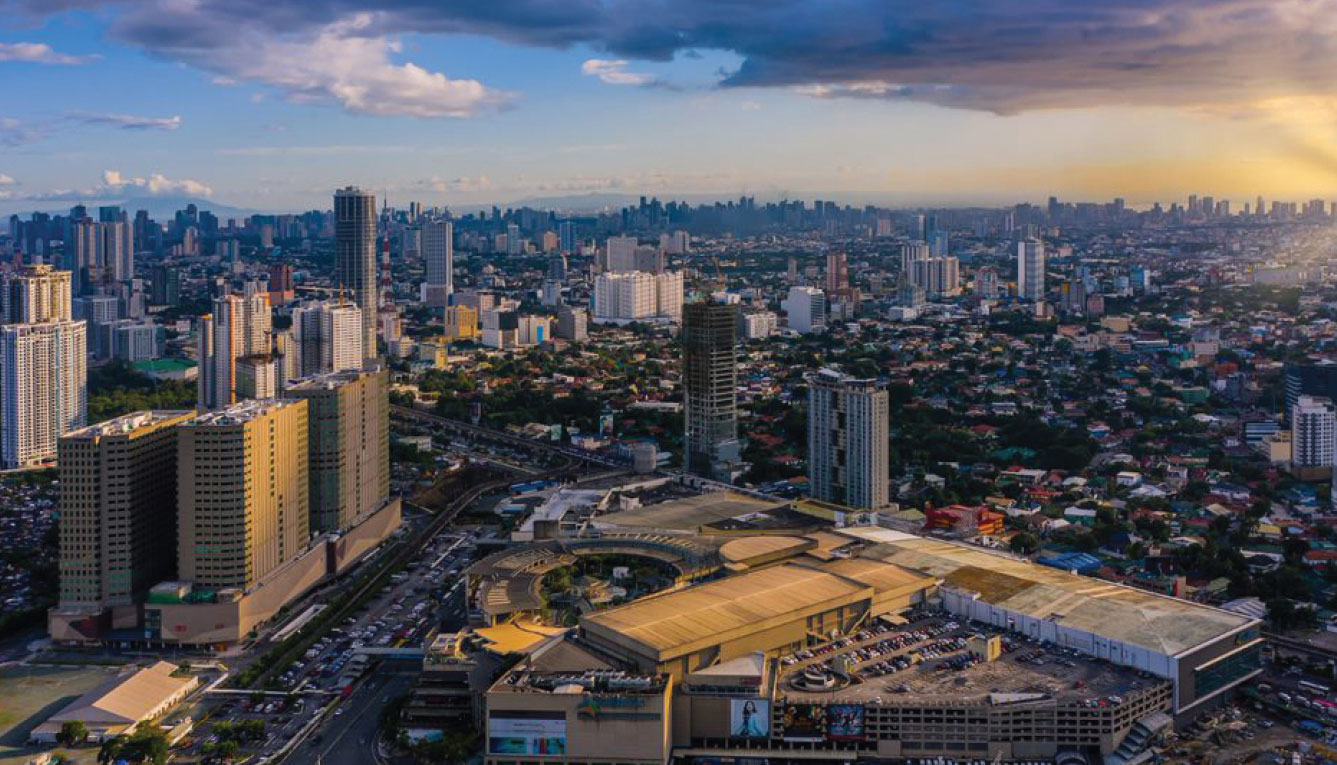
Ayala contributes to economic growth through its diverse businesses.
The Philippine government is firm in its goal to reduce the number of Filipinos who cannot afford basic necessities to 11 percent by 2022, using as a point of reference the 16.6 percent poverty incidence in 2018.
Recognizing the influence of businesses to the country’s economic performance, Ayala aims to contribute to SDG 1 (No poverty) and SDG 8 (Decent work and economic growth) by creating economic values that improve lives, especially for the underserved and unserved. Moreover, Ayala observes fair and ethical practices in its business activities.
Economic Value Distribution
Ayala contributes to economic growth through distribution of economic value among various stakeholders. In 2019, the total economic value generated by the Ayala group increased by 8.5 percent to about ₱560 billion. This growth was driven by significant increases in revenue of ALI, BPI, and Globe, and divestment gains from AC Energy and AC Education.
Of this total value generated, 76 percent was distributed to stakeholders while only 24 percent was retained by the companies. About 41 percent was used to pay suppliers to cover operating costs, 10 percent to employees, 15 percent to providers of capital, and 10 percent to government and community investments.
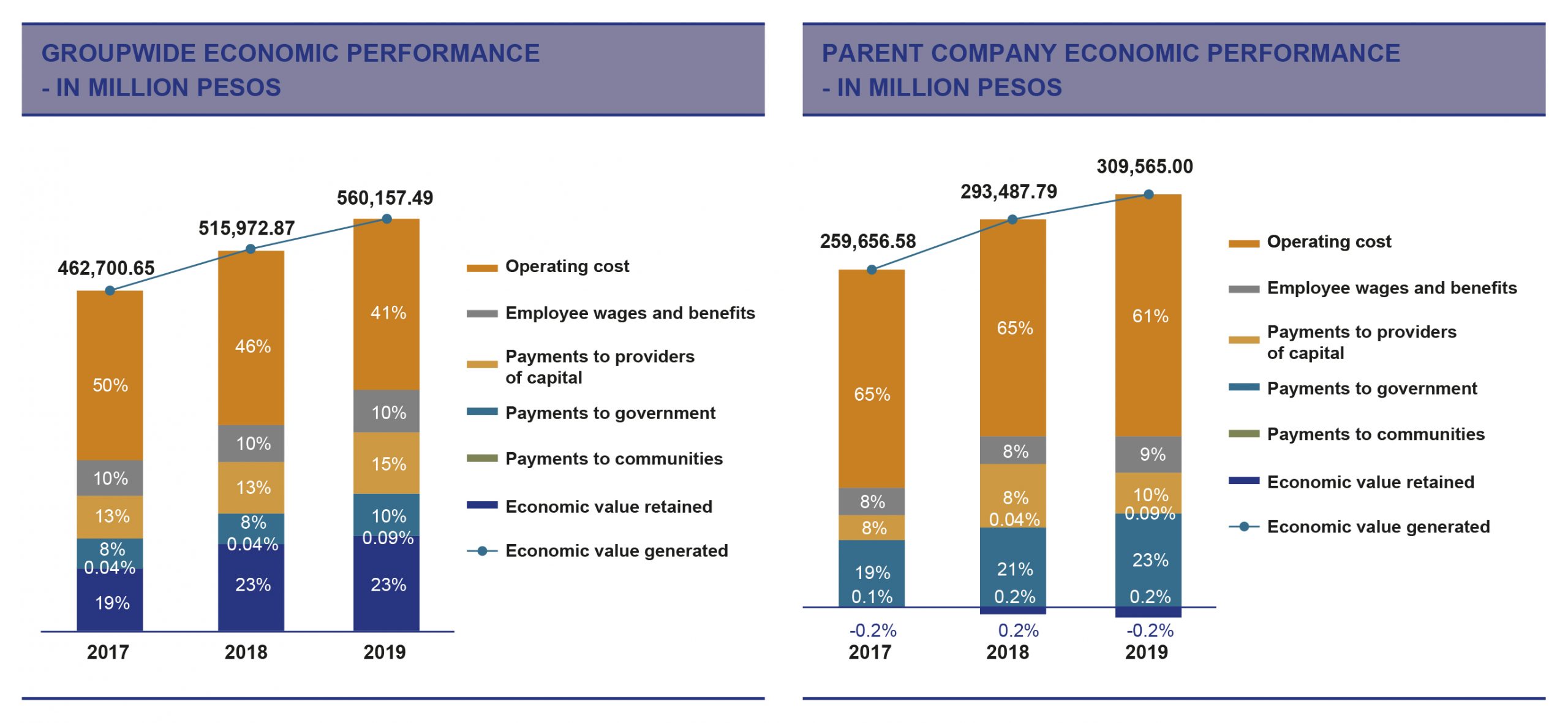
At the parent company, total economic value generated increased by five percent to ₱309.6 billion and total economic value distributed to stakeholders also increased by six percent to ₱318.9 billion.
Sustainable Procurement Practices
Ayala companies encourages their suppliers comply with quality standards and ethical practices. Our business units have their respective supply chain policies and code of conduct that require suppliers to undergo an accreditation process to examine their legitimacy, technical competence, financial capability, service quality, and, in some cases, their sustainability performance. In particular, Ayala Land, Manila Water, and IMI use environmental and social criteria for their supplier accreditation process.
Below are examples of our business units’ intiatives.
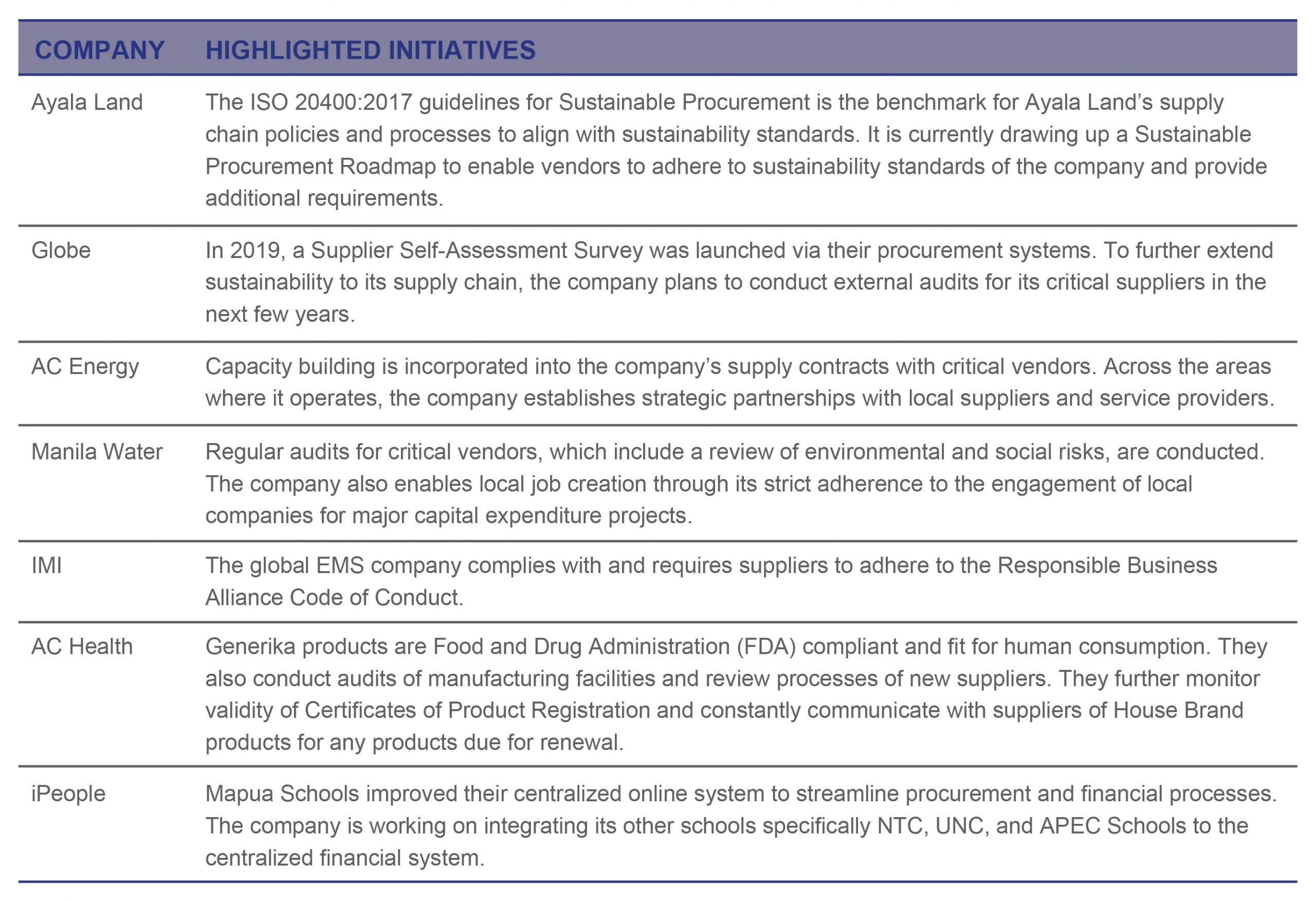
Some Ayala companies are more deliberate in their commitment to support local economic growth, cognizant that supporting local suppliers improves economic activity. The following table shows the percentage of procurement budget spent on Philippine-based suppliers by these Ayala companies.
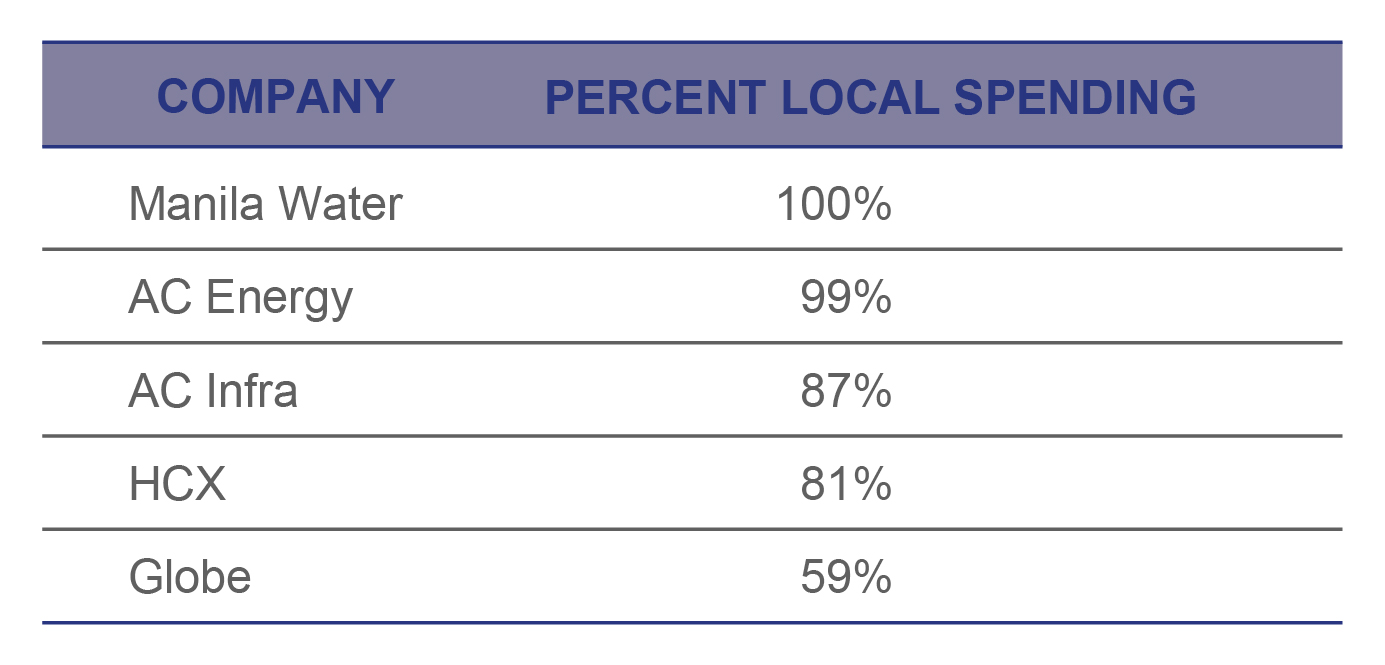
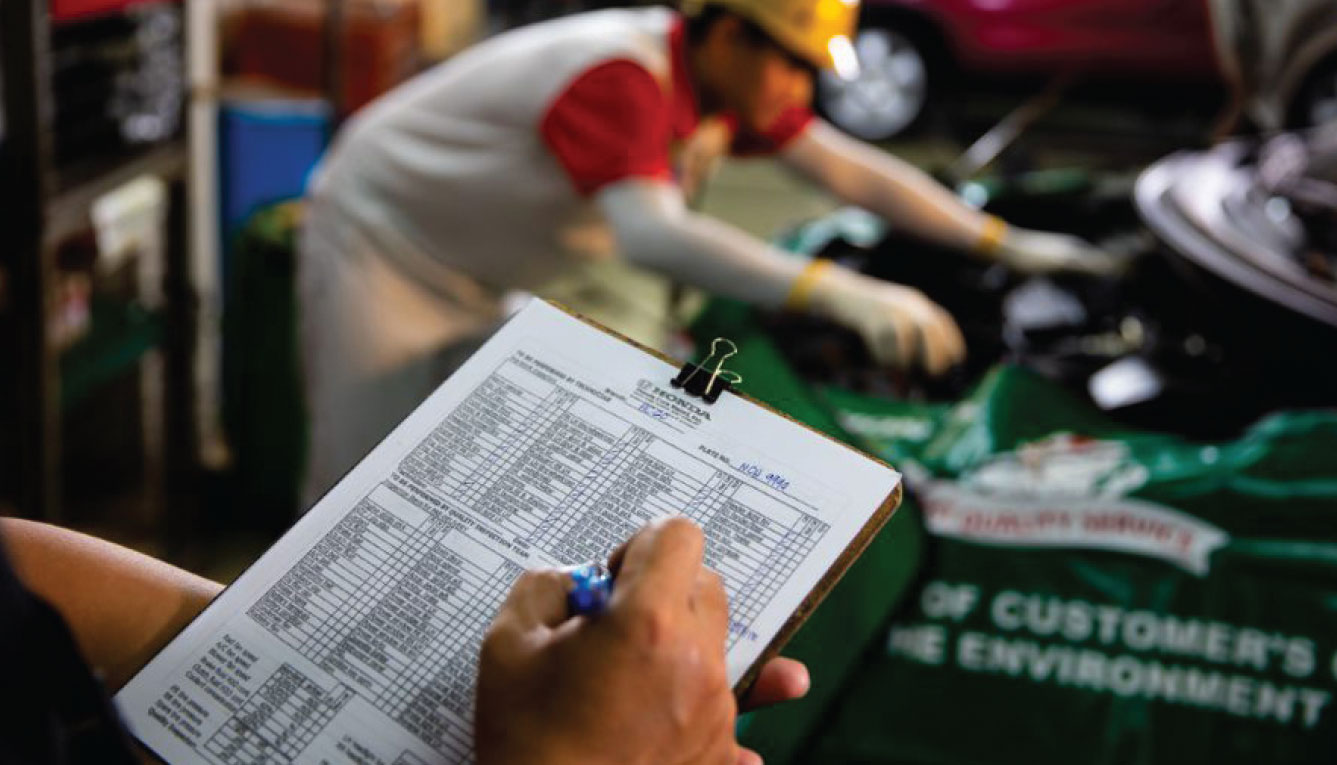
Ayala encourages its supply chain to adopt ethical and responsible practices.
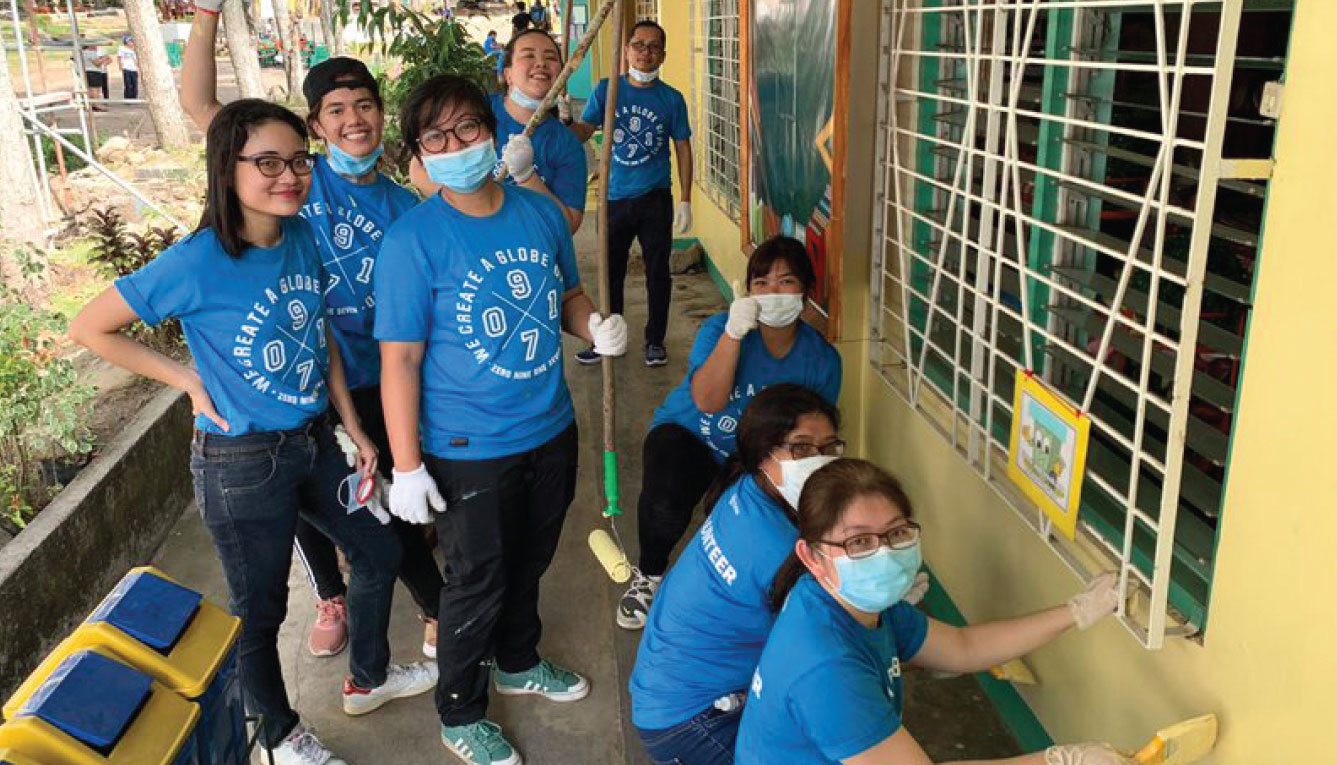
Volunteerism is encouraged across the Ayala group.
Community Engagement
Ayala builds trust among the people in areas where its businesses operate by creating value that benefits all and managing the impacts its operations may have.
Each business unit has community engagement programs that help build capabilities not only among beneficiaries but also project partners including LGUs. Most programs encourage and support volunteerism among employees.
Ayala continues to nourish the spirit of volunteerism among its employees. Its biggest volunteer-driven initiative in celebration of its 185th year is a combination of activities spanning environmental causes, donation drives, and outreach programs. When it was launched, a target of 185,000 hours was committed. This was eventually surpassed with more than 600,000 volunteer hours through the combined efforts of employees across the group.
Below are some initiatives on community engagement by the Ayala group.
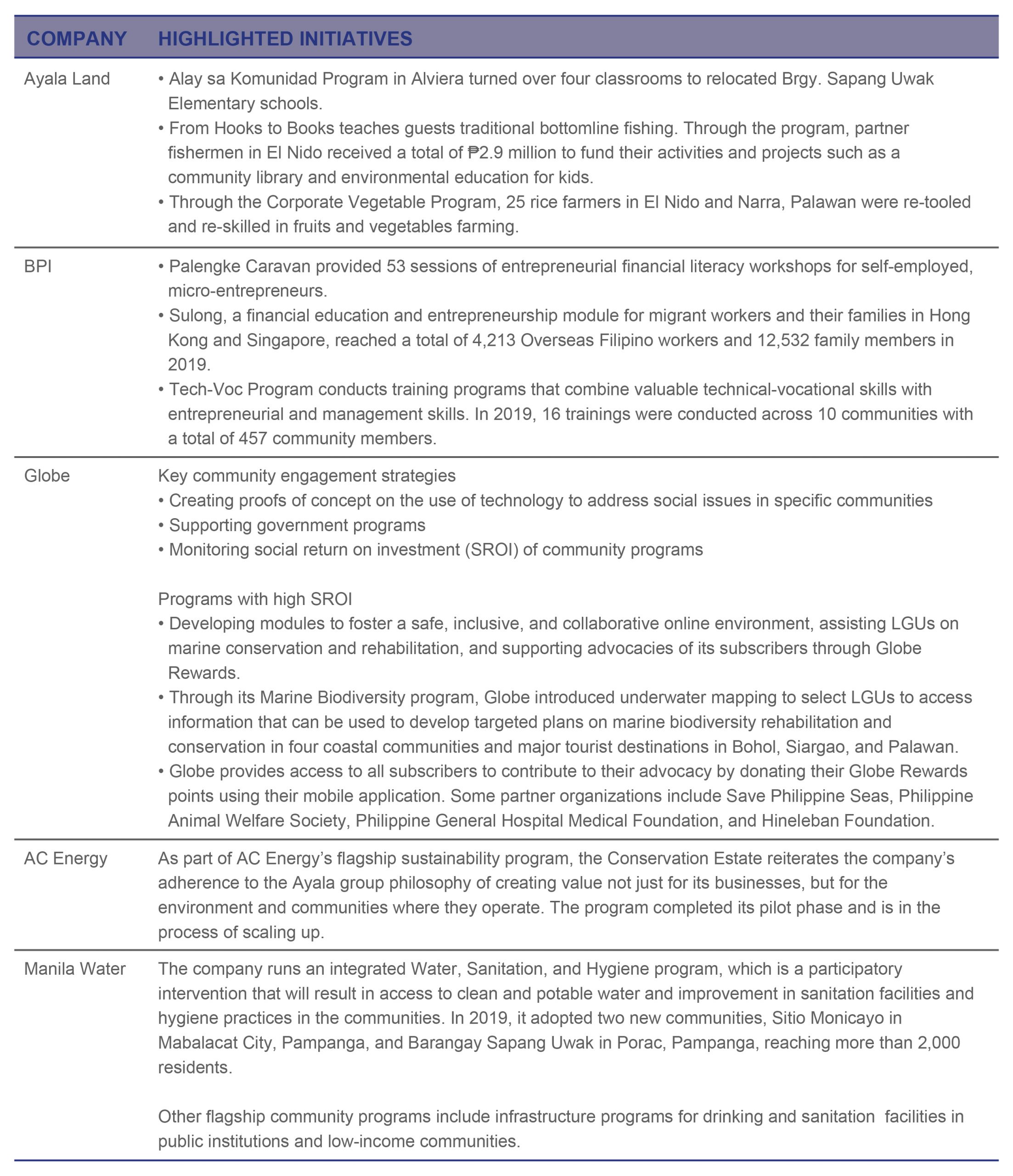
Buoyed by the knowledge that we have maintained strong foundations across the five materiality themes that we focused on in our 2019 assessment presented by emerging trends, we are confident that we can deliver more to our stakeholders.
1 What a Waste 2.0: A Global Snapshot of Solid Waste Management to 2050, World Bank, 2018
2 Ernst & Young, “Global generations A global study on work-life challenges across generations”





